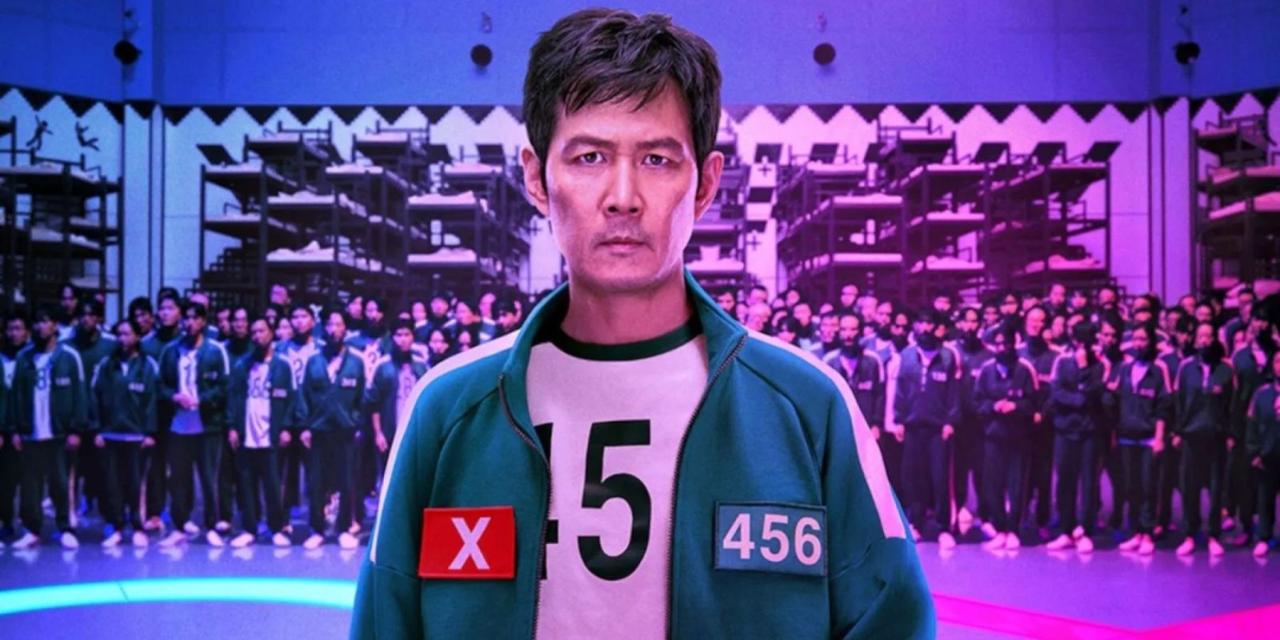Squid Game Histoire Vraie? Is the wildly popular Netflix series truly based on real-life events, or is it pure fiction? This exploration delves into the inspiration behind the show, examining the real-world parallels of extreme debt, societal pressures, and economic disparity that fueled its creation. We’ll separate fact from fiction, analyzing the show’s exaggerated portrayals of violence and desperation against the backdrop of documented cases of economic hardship.
Get ready to uncover the truth behind the games.
We’ll investigate how the show’s depiction of brutal games serves as a powerful metaphor for the struggles faced by marginalized individuals globally, highlighting the show’s insightful commentary on capitalism, consumerism, and the widening wealth gap. We’ll also discuss the global impact and cultural resonance of “Squid Game,” exploring its influence on popular culture and the social conversations it sparked worldwide.
Finally, we’ll analyze the psychological aspects of the show, examining the characters’ decisions and the underlying human behavior under extreme pressure.
The Inspiration Behind “Squid Game”: Real-World Parallels
The dystopian world of “Squid Game” isn’t entirely fictional; it draws heavily from real-world issues, particularly the crippling debt and societal pressures faced by many, especially in South Korea. The show serves as a stark reflection of economic disparities and the desperation that can arise from them.
So, you’re wondering about “Squid Game histoire vraie”? While the show is fictional, its themes of desperation and inequality resonate with real-world struggles. Think about the pressures faced by individuals, like those involved in the tragic fullerton plane crash , where the circumstances highlighted societal vulnerabilities. Understanding these kinds of events helps us appreciate the darker aspects explored in “Squid Game histoire vraie”.
Real-Life Examples of Extreme Debt and Societal Pressure
South Korea, like many other nations, experiences significant economic inequality. High levels of youth unemployment, coupled with the intense pressure to succeed academically and professionally, contribute to a climate of anxiety and financial strain. Many young people find themselves burdened by student loan debt and the pressure to maintain a certain lifestyle, leading to desperate situations mirroring the show’s premise.
Similar pressures exist in other countries grappling with high living costs and widening wealth gaps.
Economic Disparities and Social Inequalities
The stark contrast between the ultra-wealthy and the struggling masses is a central theme in “Squid Game.” This disparity is reflected in the real-world situations of many countries, where a small percentage of the population controls a disproportionate share of the wealth. This imbalance creates a system where opportunities are limited for those from lower socioeconomic backgrounds, leading to feelings of powerlessness and desperation.
Historical Context of Economic Crises and Their Impact
The show’s narrative resonates with historical events like the 1997 Asian financial crisis, which had a devastating impact on South Korea’s economy and its vulnerable populations. Such crises often exacerbate existing inequalities, pushing more people into poverty and desperation, mirroring the desperation portrayed in the games.
Comparison of Fictional and Real-World High-Stakes Competition

| Squid Game Scenario | Real-World Parallel | Description | Impact |
|---|---|---|---|
| Red Light, Green Light | High-stakes job interviews | Competitors vying for limited positions under immense pressure | Potential for exploitation, anxiety, and mental health issues |
| Honeycomb Challenge | High-pressure exams or deadlines | Individuals facing strict time constraints and potential failure | Stress, anxiety, and potential for long-term negative consequences |
| Tug-of-War | Corporate mergers and acquisitions | Teams competing for survival and dominance in a cutthroat environment | Job losses, financial instability, and social upheaval |
| Marbles | Gambling and predatory lending | Individuals risking everything based on chance or exploitation | Debt, bankruptcy, and severe financial hardship |
Debunking Myths and Misconceptions: Fact vs. Fiction
While “Squid Game” uses real-world anxieties as inspiration, it’s crucial to distinguish between its exaggerated portrayal of violence and the realities of societal struggles. The show’s extreme scenarios are designed for dramatic effect and shouldn’t be interpreted as literal depictions of everyday life.
Elements Often Mistaken as Real Events

The elaborate games and the brutal consequences are fictionalized for dramatic impact. While the desperation and economic hardship depicted are rooted in reality, the specific events of the show are not based on documented events. The scale of violence and the organized nature of the games are exaggerated for narrative effect.
Exaggerated Portrayal of Violence vs. Societal Struggles
The show’s graphic violence is a stylistic choice to highlight the desperation and stakes involved. While real-world struggles can be violent in certain contexts, the show’s level of violence is far removed from typical experiences of economic hardship.
Comparison of Fictional and Documented Poverty
The show portrays extreme poverty and desperation, which reflects the harsh realities faced by many around the world. However, the level of dehumanization and the extreme circumstances are heightened for dramatic purposes. The show should be seen as a commentary on the system, not a literal representation of every impoverished individual’s experience.
Factual Elements vs. Fictional Exaggerations
- Factual: High levels of debt and economic inequality exist globally.
- Factual: Societal pressure to succeed can lead to mental health issues and desperation.
- Fictional: The organized, large-scale deadly games are not based on real events.
- Fictional: The level of violence and dehumanization is significantly exaggerated.
- Factual: The desperation of characters reflects the struggles of many facing economic hardship.
The Social Commentary of “Squid Game”: Analyzing Themes
“Squid Game” is not merely entertainment; it’s a powerful social commentary on various societal issues. The games themselves serve as potent metaphors for the struggles faced by marginalized individuals within a system that often feels rigged against them.
Commentary on Capitalism, Consumerism, and Wealth Gap

The show critiques the excesses of capitalism and consumerism, highlighting how the relentless pursuit of wealth can create a system where the vast majority are left behind. The extreme wealth disparity between the game organizers and the players underscores this critique, showcasing the brutal consequences of unchecked capitalism.
Games as Metaphors for Struggles of Marginalized Individuals
Each game represents a different aspect of the struggles faced by the vulnerable. The challenges require cunning, skill, and often, a willingness to compromise morality, mirroring the difficult choices many face in real-life situations of economic hardship.
Exploration of Human Nature Under Extreme Pressure
The show delves into the complexities of human nature, showing how desperation and the desire for survival can lead individuals to make difficult moral choices. The games reveal both the best and worst aspects of humanity under extreme pressure.
So you’re wondering about “Squid Game histoire vraie”? While the show’s fictional, the desperation it depicts sadly reflects real-world struggles. Think about the sheer scale of coordinated movement – imagine something like that, but instead of desperate contestants, it’s a breathtaking display of technology, as seen at the china drone show 2029. The precision and coordination needed are equally impressive, highlighting a different kind of human ingenuity, a stark contrast to the deadly games of Squid Game.
Visual Storytelling Techniques, Squid game histoire vraie
The show uses stark visual contrasts – vibrant game sets against the bleak reality of the players’ lives – to emphasize the social commentary. The color palette, costume design, and set design all contribute to the powerful message.
The Global Impact and Cultural Resonance of “Squid Game”
The show’s global popularity sparked widespread discussions about social and economic inequality, making it a significant cultural phenomenon.
Global Discussions on Social Issues
The show’s success ignited conversations about wealth inequality, class disparity, and the pressures of modern society in various countries. It served as a catalyst for discussions on these crucial topics, raising awareness and prompting critical reflection.
Cultural Significance of Korean Society’s Representation
“Squid Game” offers a nuanced, albeit fictionalized, portrayal of aspects of Korean society, including its competitive culture and economic pressures. While not a comprehensive representation, it highlighted certain realities for a global audience, sparking both interest and debate about Korean culture and society.
So, you’re wondering about “Squid Game histoire vraie”? While the show’s fictional, the desperation it portrays sadly reflects real-world struggles. Think about the sheer scale of visual spectacle needed to represent that – it reminds me of the breathtaking artistry of a shanghai drone show , a massive coordinated display of light and movement. That same level of precision and organization, though for a very different purpose, is what makes “Squid Game” so captivating, even if it’s not a true story.
Influence on Popular Culture
The show’s impact on popular culture is undeniable. From fashion trends inspired by the characters’ costumes to viral memes and music inspired by its themes, “Squid Game” permeated various aspects of popular culture, leaving an indelible mark.
Descriptive Illustration of a Scene
Imagine the final scene of the tug-of-war game. The rope, taut as a bowstring, is the focal point, representing the struggle between survival and demise. The players, faces strained with effort and desperation, are silhouetted against a backdrop of stark, almost desolate beauty. The contrast between the vibrant, almost childlike nature of the game itself and the grim determination on the players’ faces creates a powerful visual commentary on the harsh realities of the competition for survival.
The Psychological Aspects of “Squid Game”: Exploring Human Behavior
The show provides a compelling exploration of human psychology under extreme pressure, revealing the complex motivations and decisions of its characters.
Psychological Factors Influencing Characters’ Decisions
Desperation, fear, the desire for survival, and the weight of past trauma all heavily influence the characters’ actions within the games. The intense pressure of the situation forces them to confront their moral boundaries, leading to unpredictable choices.
Themes of Desperation, Survival, and Morality
The show explores the complex interplay between these themes. The characters’ decisions are often driven by desperation and the need to survive, sometimes at the expense of their morality. This internal conflict is central to the show’s psychological depth.
Impact of Violence and its Consequences on Viewers
The show’s depiction of violence, while exaggerated, serves to highlight the brutal consequences of the system and the desperation of those trapped within it. This graphic portrayal aims to evoke a visceral reaction from viewers, prompting reflection on the issues depicted.
Comparison of Psychological Profiles and Motivations
| Character | Primary Motivation | Key Psychological Traits | Impact on Actions |
|---|---|---|---|
| Gi-hun | Survival and debt relief | Compassionate but desperate | Makes difficult moral compromises |
| Sang-woo | Redemption and ambition | Intelligent but ruthless | Prioritizes winning over morality |
| Sae-byeok | Financial security for family | Strong-willed and resourceful | Displays fierce determination |
| Ali | Financial support for family | Kind and trusting | Shows unwavering loyalty |
Final Thoughts: Squid Game Histoire Vraie
Ultimately, while “Squid Game” is a work of fiction, its impact stems from its chillingly realistic portrayal of societal issues. The show’s success lies in its ability to translate complex themes of economic inequality and human desperation into a gripping narrative. By examining the real-world inspirations behind the show, we gain a deeper understanding of the global struggles it reflects, prompting reflection on our own societies and the systems that perpetuate such inequalities.
The games may be fictional, but the underlying issues are painfully real.
Q&A
Were any of the games in Squid Game actually played historically in Korea?
No, the games depicted in Squid Game are fictional and not based on any known historical children’s games in Korea.
Is the level of debt portrayed in Squid Game realistic?
While the extreme levels of debt shown are exaggerated for dramatic effect, the show accurately reflects the struggles many face with debt and financial instability in South Korea and other parts of the world.
Did Squid Game inspire any real-life copycat incidents?
There have been reports of some copycat incidents inspired by the show, highlighting the need for responsible media consumption and awareness of the show’s fictional nature.
What is the show’s overall message?
Squid Game offers a powerful critique of capitalist systems, highlighting the desperation and inequality that can drive individuals to extreme measures. It also explores themes of human nature, morality, and survival under pressure.
